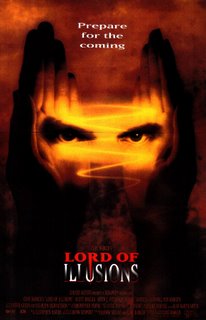
Man is a rope, tied between beast and overman - a rope over an abyss... What is great in man is that he is a bridge and not an end: what can be loved in man is that he is an overture and a going under... I say unto you: one must still have chaos in oneself to be able to give birth to a dancing star. I say unto you: you still have chaos in yourselves. Alas, the time is coming when man will no longer give birth to a star. Alas, the time of the most despicable man is coming, he that is no longer able to despise himself. Behold, I show you the last man.
--Friedrich Nietzsche, "Also Sprach Zarathustra"
5 Jesus said, "Know what is in front of your face, and what is hidden from you will be disclosed to you. For there is nothing hidden that will not be revealed. And there is nothing buried that will not be raised."
29 Jesus said, "If the flesh came into being because of spirit, that is a marvel, but if spirit came into being because of the body, that is a marvel of marvels. Yet I marvel at how this great wealth has come to dwell in this poverty."
--From the Gnostic Gospel of Thomas
"Flesh is a trap...and death is an illusion."
--from Lord of Illusions
You know when you're watching a film by Clive Barker, that you're in good-hands. I saw this in 1995, and was floored by an oddly-believable tale of magic, both ancient and modern. It's interesting to note that Mr. Barker is well-versed in occult-lore, and that when you view his films he's trying to mess with your head on several-levels at-once. Magic is real, we do it every day, but it's seldom-acknowledged. When we think-of-something--an action, or a wish--and we externalize-it into-reality, we have done something that is magical. Animals are also capable of this, but none-so-well as human-beings. Technology is also an externalization of the human-mind (and body), and stems from a scientific-tradition that began with alchemy. In the mystery-traditions, an initiate would be immersed in a symbolic-environment, just as advertising does today for darker-aims! We live illusion every-single-day. If-only illusion wasn't dead in pustulent-Hollywood.
The battle-between the flesh and this world is eternal, and Clive Barker throws us into the midst of this battle. The film begins in-flashback to a cult-compound that looks a disturbingly-similar mix between the Branch Davidian one in Waco, and Spahn Ranch in Death Valley (once-populated by the Manson Family). This is the story of the birth of a religion, and where-else do they usually begin? The desert, of-course. But Barker takes-it-further, and we get what could be taken as an inversion of the Christian-myth of Jesus. Nix is the messianic-figure, who tells his disciples, "Fire spoke to me and said--NIX, you are the chosen-one, the Puritan." Unlike Christ's meeting with Satan in the desert, Nix succumbs-to-temptation, and his hatred for the material-world. Has he met-with darkness, or is it fire-itself, an elemental-force? Barker let's US decide throughout what we are seeing-and-hearing--yes, he's playing-with us. Maybe this ISN'T an inversion of Christianity, after-all...
But, Nix is betrayed in the opening-prologue by his chosen-one, Swann. 13-years pass, and Swann is an incredibly-successful stage-magician, using the skills taught him by Nix. He has a consort in Dorothea, and in a direct-reference to Gnosticism, a wizard's assistant in Valentin. Being our cinematic eyes-and-ears, we are introduced to the Detective Harry D'Amour, a gumshoe with a penchant for the unknown in the occult-underworld. We get-treated to some great film-noir moments thanks to Barker's genius-take on the PI character, and it blends with horror effectively. A lot of credit has to go to Scott Bakula for his performance as D'Amour, it's a tightrope-role that requires a subtle-approach, with a little humor and cynicism. He's our surrogate, and his disbelief is crucial to our accepting the realities of this story, a tall-order! I believe Barker and his collaborators succeeded in-spades.
Interestingly, Clive makes a wonderful-homage to Orson Welles (himself an illusionist of high-caliber) in the early murder-scene of the fortune-teller. It's shot in the very-same Venice locations as Welles' "Touch of Evil" (1958), a noir-classic. In some-respects, this film also resembles Welles' "Mr. Arkadian", with a detective searching a man's past as the central-narrative--this was also copied by Alan Parker and his writers on "Angel Heart" (1986), another classic of horror. Barker also references Mario Bava's "Black Sunday" (1960) with the tale of a resurrected-witch/wizard, and the mask that punctures Nix's face into a ghastly-visage.
By the end of the film, it's clear that Nix has come to destroy the world (like Jesus), and we are shown realities we'd rather forget. In-a-sense, there are many criticisms of ALL world religions here, even esoteric-ones. Barker condemns the notion that it is the world that corrupts, and that material-reality is the only source-of-evil and destruction. Mankind can be that essential-ingredient ("Fire spoke to me and said...") of chaos and destruction--we hold our fates in our own-hands, we are that hand-of-fate in occultism. We stare into-the-abyss, like Nix and Swann, and realize there is nothing, only ourselves. WE are the meaning in the universe, because we create that meaning. Nix, his followers, and Swann succumb to this, and decide non-existence is better. Harry D'Amour, and his allies in the story, do not. The battle, then, is between creation and destruction, not good-versus-evil. D'Amour and Dorothea are an erotic and productive-dyad, whereas Swann and Nix are not. The Apocalypse is always in human-hands when individuals succumb to the forces of the universe that are destructive. They have given-up.
No comments:
Post a Comment